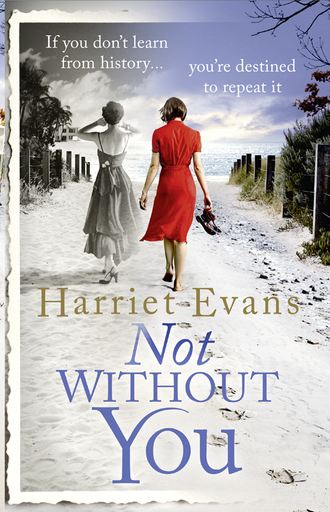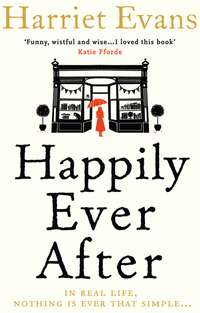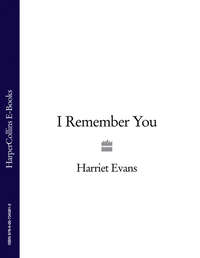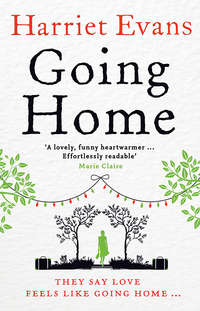
Полная версия
Not Without You
‘What happens if I don’t stay quiet?’ I said. ‘What about if I tell them I’ve made a mistake and I want to go home?’
‘Do you think that?’
I breathed out. ‘Um – no.’ My throat felt tight all of a sudden. ‘I’m not sure. It’s been two weeks and …’ I swallowed. ‘This is stupid. I’m homesick, I suppose. It’s such a different world.’
The sky above us was that peculiar electrifying deep blue, just before the moon appears. He took my hand. His skin was warm and his fingers on mine strangely comforting, even though he was a stranger. ‘Hey,’ he said. ‘Look at the stars above you.’ I looked up. ‘And the fruit on the trees, the smell of money in the air. You’re in California. You were chosen to come here. You’re going to star in what could be the biggest picture of the year. I know Louis can come off as a jerk, but he knows what he’s doing, trust me.’ He shrugged. ‘This is the break thousands of girls dream about.’
‘I know,’ I said. I wished I could put my head on his shoulder. I could smell tobacco and something else on his jacket, a woody, comforting smell. ‘And I can’t go home. The thought of going back to London with my tail between my legs. And seeing my parents – explaining to them.’ I stood up straight. ‘I have to get on with it. Stiff upper lip, and all that.’
‘You British,’ he said. He released my hand. ‘Where’s home, then?’
How did I explain I didn’t really have a home? ‘Oh, it’s a village in the middle of the countryside. But I was at drama school, in London. I was living in a place called Hampstead. That was really my home.’
‘I’ve always wanted to go to Hampstead. Oh, yes,’ Don said, smiling at my surprise. ‘My father was a teacher. Taught me every poem Keats ever wrote.’ I must have looked completely blank, because he said, ‘Keats lived in Hampstead, you little philistine. I thought you Brits grew up on the stuff.’
I shrugged. ‘He didn’t write plays. I like playwrights.’
Don leaned his lanky body against the tree, sliced a little more avocado, and said, ‘How about screenwriters?’
I smiled. ‘I like them too, I suppose.’
‘I’m glad to hear it,’ he replied.
‘There you are, Eve.’ Mr Featherstone came waddling out onto the terrace. ‘I was wondering where you’d got to.’
‘I’m so sorry,’ I said guiltily. ‘I met Don – Mr Matthews – again, and we were—’
‘I was monopolising your star,’ Don said smoothly. ‘I should let you go.’
‘No, I don’t want to interrupt,’ Mr Featherstone said genially, wiping his moist brow with a handkerchief. ‘Eve, I wanted you to meet the head of publicity for Monumental, Moss Fisher. He’s a great guy, and if he likes you too I really think the Monumental deal’s in the bag.’ He smiled at me. ‘Joe Baxter liked you, honey. Really liked you. He wants us to go out to dinner with him. So I’m gonna take you to meet Moss now and then we’re going to Ciro’s. You’ll love it.’ He looked at Don. ‘Won’t she, Don?’
‘Depends,’ Don said. ‘But yes, I think she might like it. If she makes up her mind it’s what she wants.’
The shade from the tree was black. I couldn’t see his face. ‘Well,’ I said. ‘Goodbye – and thank you.’
‘It was my pleasure,’ he said. ‘Hey, do something for me, will you? Try and enjoy it.’
He moved away and I suddenly realised I might not see him again. I don’t know why but I called after him, ‘I loved Too Many Stars. It’s my favourite film.’
He stopped and turned around, one half of his slim body golden in the light from the hallway, the party. ‘Thank you,’ he said. ‘Thank you, Rose.’
He disappeared through the door and then he was gone.
‘Did you tell Don Matthews to call you Rose?’ Mr Featherstone said, a note of displeasure in his voice as he steered me back inside. ‘Why would you do that?’
‘I – it’s – oh, we were having a joke.’ But then the guilt I always felt deepened some more, as though I thought Rose was something to joke about. ‘I’m sorry, I won’t do it again,’ I said, more to myself than to him.
‘It takes time to learn these things,’ he said. ‘You’ve done very well, my dear.’ His eyes ranged over my dress again. ‘Now, here’s Mr Baxter. And Mr Fisher. Be nice. Moss, hey! This is the little lady I was telling you about. Eve dear, this is Moss Fisher.’
Out of the shadows stepped another man, thin and even shorter than the Baxters. His thick curling hair was smoothed down with Brylcreem or something that made it look wet. His dark eyes darted from side to side, then stared coldly at me. He nodded.
‘Hi,’ he said, to no one in particular.
‘Hello, Mr Fisher,’ I said politely.
He didn’t acknowledge this, but turned to Joe Baxter. ‘The teeth need fixing, Joe.’
‘Yes, I know,’ Mr Baxter said under his breath. ‘Still though—’
‘How old are you?’ Moss Fisher asked, almost uninterestedly.
‘I’m – I’m nearly twenty.’
He nodded. ‘Maybe it’s worth it,’ he said. He shrugged. ‘The hairline, too. It’s awful but they can change it. Do a screen test. I’m going, Joe. See ya tomorrow.’
Joe Baxter rose a hand in farewell as Moss Fisher walked away.
‘Don’t mind Moss,’ he said jovially. ‘He’s all business. A great guy, a great guy, isn’t he, Louis?’
‘Oh, yes,’ said Mr Featherstone. He stared at my hair in annoyance. I put my hand up to my brow, self-conscious.
Behind me, Mrs Featherstone had brought my velvet cape. With a quick flick of her wrist she twisted it up and around my shoulders, and I screamed, and she jumped. Mr Baxter was standing behind the cape. ‘Sorry,’ I said, clutching my hand to my heart, which was thumping ridiculously. ‘I didn’t see you, Mr … Mr …’ Suddenly I couldn’t remember his surname. I smiled in what I hoped was a charming, apologetic way.
‘It’s Baxter,’ he said, putting his watch into his pocket and offering me his arm. ‘Come, my dear. We’ll ride to Ciro’s together. I’d like to show you my Rolls-Royce. All the way from England. Louis, we’ll see you there?’
We left the party, and I remember it clearly now, to this day, how the waiter bowed and said, ‘Goodnight, Mr Baxter, congratulations on Eagles Fly North,’ and Joe Baxter ignored him. I don’t think it was because he was a rude man. It was because he simply didn’t notice people like waiters. It was as if they were completely invisible to him. He could only see two things: stars and power.
‘Here we are,’ said Mr Baxter as we approached a powder-blue Rolls-Royce, waiting on the kerb for us. A driver jumped out and opened the door. I looked around for the Featherstones, but I couldn’t see them.
‘Oh …’ I said, and I must have sounded wary.
‘I’m sorry,’ said Mr Baxter, smoothing his hair over the top of his head again. ‘They’re getting a ride with Lenny.’ He looked around. ‘Would you feel more comfortable with them here too? Yes, you would.’ He signalled to the driver. ‘Go and find Mr Featherstone.’
‘It’s no problem, Mr Baxter,’ I said. ‘I just wanted to make sure they were coming too.’
‘Of course,’ he said. He held the door open. I climbed in and he followed me. ‘I don’t want to do the deal with you, now do I? Or are you telling me you have a head for figures too, as well as a figure that turns a man’s head?’
I laughed; I couldn’t help it, and I wondered what Clarissa would say if she heard him. But Clarissa was thousands of miles away, asleep. I knew tomorrow was Thursday, and she’d have vocal classes first thing in the morning. Making ridiculous vowel sounds, sitting cross-legged on the floor and pretending to be farm animals. That was what we’d done, the final class I’d taken, before I said goodbye to her, to my friends, and left them behind for ever.
The seats were huge, the butter-coloured leather soft, sewn with tiny powder-blue stitches that matched the outside paint. ‘What a beautiful car,’ I said politely, trying to sound normal. The two of us alone together in the back was rather strange.
Mr Baxter put his hands on his knees, and sat up straight, looking ahead. He muttered something under his breath. ‘Thank you, dear. Now tell me, where are you from in England?’
I answered, as I’d been told to by Mr Featherstone, ‘Warwickshire. Shakespeare country.’
‘Very good. Your father’s job?’
‘He’s a doctor,’ I said. ‘He’s a very good doctor.’ I don’t know why I said this. I ran my fingers along the polished walnut interior, tracing the clover-shaped whorls of the wood. We drove off slowly, and my stomach lurched. I was hungry, or nervous, I didn’t know which.
‘Any brothers or sisters?’
‘I had a sister. She died.’
He nodded, eyes still fixed straight ahead of him. ‘Sad. Anything else?’
The spot in the river where Rose drowned was next to a willow tree. The trunk was hollow and almost dead, but there were green tendrils creeping off it and eventually they might make another whole tree. When I was little I used to think she lived inside it, that she’d just come back one day. I’d play by the tree, and talk to it, until Mother said I wasn’t to any more. I said, ‘Anything else? I—’
‘Any stories we need to know, any secret marriages to unsuitable actor boyfriends, kids, anything that the fan magazines or the gossips can dig up on you?’
‘No,’ I said, shaking my head. It was so strange the way everyone in Hollywood wanted to know about the secret past lives I’d lived before I’d got here. I wasn’t twenty till November. I’d done nothing with my life, really. I’d never been abroad, unless you counted holidays in Scotland. ‘Nothing at all.’
‘Nothing at all? You’re not lying?’
‘No,’ I said. ‘I’m very dull, I’m afraid.’
Mr Baxter said something, to himself this time. He turned to me. ‘I would disagree, my dear,’ he said, and he moved across the seat towards me. He put his hand on my knee, then slid the palm up my thigh. I remembered again his clammy, hot skin.
The strange thing is I didn’t do anything. I was so surprised I sat there, bolt upright. He was such an odd man, with his black comb-over, his fat, unexpressive face, his strangely babyish expressions. I thought he must have made some kind of mistake. But then he reached out and, with the other hand, squeezed my breast, then stopped and made a snuffling noise. His fingers started scrabbling at the neckline of my dress, flickering under the velvet to try and worm their way towards my bare skin as all the time his other hand scratched at my underwear, under the skirt. I pushed him away, a short sharp action, and he fell back against the seat.
‘Mr Baxter!’ I said, thinking how high and stupid my voice sounded, and what a silly thing it was to say, like a heroine in a melodrama.
He was breathing heavily, and his eyes darted around, avoiding mine. He reached for me again, only this time his clammy, horrible hands were under my backside, and he pulled me further down so that I was half-lying with my head against the door, then he lifted my skirt and pushed it up over my hips. I screamed, in indignation more than anything else, but he put his hand over my mouth. I bit him, and I heard the snuffling noise again, as he started nibbling at my ear, my neck, my jaw, with slippery wet movements, and the sound he was making was like the jeering newspaper boy I scurried past outside Hampstead Heath tube every morning: heheheheheheh, heheheheheheh, only very soft.
‘Pretty girl, pretty girl,’ he said, in this soft, high-pitched tone. ‘You’re a very pretty girl. Now you lie still. The driver understands – he won’t stop till we’re finished.’ He smiled at me, a little impatiently. ‘Unzip the dress … unzip the dress …’ Again the snuffling noise, as he licked my ear, juddering against me in excitement. He slid his hands underneath me, undid the zip and pulled the beautiful velvet dress down my shoulders, and I struggled to free my arms. I could see the driver through the glass. Did he drive him around every day, while he did this? He didn’t move. His green cap, clipped hair. And I knew if I screamed he’d take no notice.
Joe Baxter pulled the dress further down, so it was ruched around my middle, the bottom half pulled up to my stomach. My neck felt as if it might snap. He pulled my breasts out of their brassiere, chuckling to himself, then buried his head between them, murmuring. Heheheheh. Heheheheh. It got faster and faster, and he started rocking against me. He took my hand and rubbed it up and down the front of his trousers. I could feel his hard penis. I knew that much, at least; my boyfriend at Central, Richard, and I would kiss for hours the week when I had the good bed in Hampstead, and I knew this was what happened to him after a while. But Richard was a vicar’s son, a sweet gangly boy from Yorkshire. It wasn’t like this with him, this undignified, frightening tussle, in which I didn’t know where I was or who I was.
And so it was the first time then, I suppose, that I realised I had to pretend it was happening to someone else, not me. Eve Noel. Pretend you’re this girl called Eve Noel. The indignity of it was worse than the force, the assumption of rights over my body. He was mounting me, in his own car, and his driver was ignoring us. I didn’t know where we were. I didn’t know where my hotel was, or how I’d get home. As I lay with him above me, looking out of the window at the blurred scenery, I could see palm trees flying past us, and a street light.
He pumped against me, holding my hand against his body, and then he said, ‘It’s time, you pretty little girl. I want to play with you. You’re so beautiful. I won’t hurt you …’
So I acted then. I knew suddenly that I wasn’t going to lose my virginity to him. I wasn’t going to start a baby because I’d been violated in a car by this fat, awful man, because he had power and I didn’t. I pushed him back, in a different way this time. I caressed his neck and pushed my breasts into his gobbling face. ‘Let me do something,’ I said, sitting upright, playing bright and confident, laughing. Rose used to laugh, hiding and then appearing behind the willow tree. ‘Catch me if you can,’ she’d say, and then she’d vanish, her fleet steps taking her further and further away.
I kissed his neck, his oily, stubby neck, watching the palm trees over his shoulder so I didn’t gag. And then I opened his trousers, and did what I used to do with Richard. Only two weeks ago, two weeks and one day in fact. I rubbed him with my hand, pushing my breasts against him rhythmically, until he groaned, spurted his stuff all over: all over me, all over him, all over the buttery leather. And then, God help me, I kissed him on the mouth, and told him how much there was of it, how big he was, and how it scared me. And then I zipped his trousers up as his head lolled forwards and he panted, still making that snuffling noise in his throat.
He patted my head after his breath was back. Squeezed my breasts again. But I knew he wouldn’t be able to do it again, not for a while. He was old. I was young, I look back now and smile to think how extremely young I was. I wiggled myself back into my brassiere, slid the beautiful dress over my arms and shoulders again. I moved towards him. ‘Mr Baxter,’ I said, in a sweet, little-girl voice. ‘Could you zip me up again now?’
I gave a little giggle. And he did too, girlish and funny, as if we’d just enjoyed a picnic in the woods, not a rape.
‘You know some tricks, don’t you, Eve?’ he said. He zipped me up, and kissed the top of my neck. I held still. Now it was over, now he’d zipped me up, I felt sick. His hand stroked my thigh again. ‘Pretty girl, but you’re a clever girl too, aren’t you?’
‘Just like Helen of Troy, Mr Featherstone says,’ I said in my best cut-glass English accent.
‘Very good,’ he said. ‘Very good.’ He stared at me. ‘You’re beautiful. He’s right.’ He ran his fingers over my forehead, and I tried not to flinch, hating him, hating myself.
‘But I think you’d look better with a widow’s peak. Change the hairline. Moss is right. He’s always right, goddammit, the son of a bitch. I’ll speak to Tyrone at the studio – he’s the master. Smile?’
I smiled, automatically, too shocked to know what else to do. He was panting still, as if trying to regain his breath. ‘Yes,’ he said softly. ‘The teeth, maybe the nose. But it’s fine. I’ve seen worse. I’ve seen much worse. Well done. We’ll arrive shortly. I tell you, I could use another drink.’
He gave another snuffling laugh and patted my thigh with his clammy hand. He didn’t seem unduly pleased with himself, or to think that he’d done anything wrong or marvellous. It was, I realised, purely transactional. In a way that made me hate him even more.
On the door of the Rolls was a tiny silver vase, fixed into the walnut, with a spray of roses in it. Mr Baxter took a single stem out and gave it to me. It was a white rose, beginning to bloom, its waxy petals slowly unfurling, glowing in the dark of the car like something ghostly.
‘This is for you,’ he said.
I took it and smiled at him, and put the rose in the buttonhole of my cape. I could smell its rich, heady scent. I knew that by accepting it I was accepting something bigger. I knew I shouldn’t but I did. I went along with it because I was desperate for the part, and I realised it then. I wanted to act, that’s all I’d ever wanted to do. But I know now I did it because my survival instinct is strong. Over the years, I convinced myself it was because I wanted to act. And so it became acceptable for me to do things that I’d never have done before, because I told myself I wanted to act. It came out of this night, the warm night that I met Don Matthews and he gave me an avocado; my first Hollywood party, the night I ended up in the back of a car with bruise marks on my thighs and scratches and an angry red rash from his stubble on my breasts, marks I ignored as I’d ignored the indignity of the situation and got myself through it. It was the beginning of everything, and the end of something too.
CHAPTER FOUR
THE CAR WINDS through the dusty, shrubby hills, into Mulholland Drive, and begins its twisting final ascent towards Casa Benita. I’m staring out of the window, at nothing really, and so I jump when Denis, the security guard, taps on the glass and waves.
‘Hi, Sophie, that was quick! You’re back so soon!’
I wave at him, but don’t correct him. Denis is not as young as he once was. He was a doorman at Caesar’s Palace in the seventies. He’s seen a lot; I like to think of this job as his reward in later years for services to excessive celebrity behaviour. My life’s pretty boring: he just has to sit at the gate doing his crosswords and wave through packages and the occasional sushi takeout. No wrestling Frank Sinatra to the floor or mopping up Elvis’s girlfriend’s vomit.
As we pull up in front of the house Tina lopes onto the terrace. She is tall but her shoulders droop; the afternoon light catches her dark hair.
‘Hi, Sophie,’ she says as she opens the car door. ‘How’re you doing?’
‘I’m good, thanks,’ I say, hopping out. I stretch, looking up at the bougainvilleas and jasmine scrambling along the walls in a riot of purple and white. When I first came here to look around, all I knew was that it was Eve Noel’s old house. I didn’t expect to fall in love with it. The realtor stood by my side, like a cat ready to pounce, as I gazed round at the light, airy rooms.
‘If you knocked it down,’ she told me excitedly, ‘you could really build something beautiful here. I mean that hydrangea –’ she gestured out at the wall beside the pool, where white flowers and green foliage smothered the whitewash – ‘it’s been here like half a century.’
‘Why would you knock it down?’
She looked at me like I was crazy. ‘It’s old,’ she said.
‘That’s why I like it,’ I told her.
‘Isn’t it a beautiful day?’ I ask Tina now.
‘They say there’s a storm coming,’ she says sadly. Tina is not a positive person.
T.J. heaves out the box of scripts. ‘Can you put those in my office, T.J.?’ I look at Tina. ‘How are you?’
‘Good, good,’ Tina mumbles. Her lips are like hard chipolatas. I don’t know whether to offer to pay for it to be sorted out; I know a surgeon who could do it, but maybe she loves those lips, thinks they make her look like Nicole Kidman or something. She says awkwardly, ‘Carmen said to tell you she has lunch ready – you’re on week two of the diet already.’
‘OK, great.’ I take my sunglasses off and head into the sunny hall which smells of grapefruit, the floorboards gleaming in the midday glow. I breathe in. I love coming home. No matter how stupid the day, how cruel some studio exec has been, how spiteful some TV report about me is, being back here always makes things better. I control this environment and I feel safe here.
I decide to start on some of the scripts now: I’m so hungry, but if I hold out a while longer the lunch will go even further, though already I feel kind of faint. I’m glad I don’t have any interviews coming up. You have to munch down a burger and chips to convince the (female) journalist you love food and you’re just naturally this thin. I hate it. I wish I could just say once when someone asks, ‘Candice, no one’s naturally this thin, for fuck’s sake! I’m this thin because I eat bloody nothing!’ I know a famous actress, an A-lister, who wanted a baby but was so terrified of putting on weight that someone else had the baby for her and she wore an expanding prosthetic belly for four, five months. I don’t know how we got like this, but it’s wrong, isn’t it?
Tina follows me into my office as I sit down in the swivel chair and swirl around – I like the swivel chair for that very reason. I touch my fingers together, like when I was young and used to practise being a newsreader.
‘Any messages?’
Tina starts and frowns, glaring at her BlackBerry. A vein pulses on one caramel-coloured temple. ‘OK, well, while I remember, Sophie, Kerry from Artie’s office called about finalising the time for you to meet up with Patrick Drew. They’re thinking coffee, in a cool place in West Hollywood. He’s on board.’
‘Fine,’ I say, without any enthusiasm. I’m sure he’s going to be a massive douche. I wish I didn’t have to bother. Maybe I could get George to come along too? He is the director, after all. The thought of George makes me sit upright – a cool breeze seems to slide over my face and down my neck. George. Mm.
‘There are a couple of additional publicity days next week for The Girlfriend, you remember?’
‘Yep,’ I say. ‘What do I have to do?’
‘Ashley sent over the schedule. You’re in NYC next week, going on The View and maybe Today if we can get it to work. And you’re on Ellen in a couple weeks, I’ve sent the dates to your diary.’
I am twisting round in the chair. ‘Great. You should come then – you love Ellen, don’t you? You could meet her.’
‘OK. Sure.’ Tina looks mortified at my attempt to be friendly. She always does, so I don’t know why I bother, except I hate the fact I work with her and have no other interaction with her apart from conversations about my schedule, my diet, my photo shoots, my security.
The door bangs open and T.J. appears with the box of scripts. ‘Here?’ he says, gesturing to the floor.
‘No, on the desk, please. I’m going to start going through them now.’ I try to sound businesslike.
‘But you hate reading scripts,’ T.J. says. ‘You never look at them.’
‘Thanks, T.J.’ I shake my head and ignore him.
‘Do you have anything on tonight?’ Tina asks me.
I’m waiting for George to call. ‘I’m not sure … I might slob out in the den. There’s an Eve Noel season. Lanterns Over Mandalay’s on TNT tonight.’
‘Oh. Haven’t you seen all her films like a million times?’ asks Tina with a shy smile.
‘I don’t care,’ I say. ‘It makes me happy.’ It’s true, it does, even when I’m sitting there sobbing my heart out at the end of A Girl Named Rose or Triumph and Tragedy, which is a strange film, and Eve Noel herself is strange in it. It’s about a nurse who keeps having visions. I think they were trying to replicate the success of A Girl Named Rose but it didn’t work. It was a big flop. She disappeared afterwards, left this very house and no one knows where she went.






